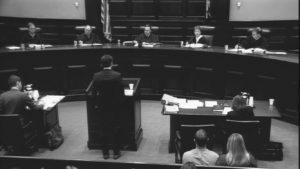Issue Preservation on Appeal in South Carolina

Jay Anthony arguing before the Supreme Court of South Carolina
When handling a case on appeal, it is, of course, important to address and refute the arguments made by the other side. But it is essential to first determine whether those arguments should even be considered by the court. This is the doctrine of issue preservation.
Unlike legal systems in other countries, our appellate courts are primarily courts of review. This means that the appellate courts will not re-litigate the case. Instead, the courts will look to see if there were errors in the trial such that the verdict or judgment should be modified or overturned. In short, there’s no “second bite at the apple.”
For this reason, when a case is before an appellate court, the court will consider only those issues which were presented to the trial court. As stated by the Supreme Court of South Carolina: “It is axiomatic that an issue cannot be raised for the first time on appeal, but must have been raised to and ruled upon by the trial judge to be preserved for appellate review.” Creech v. South Carolina Wildlife and Marine Resources Dep’t, 328 S.C. 24, 491 S.E.2d 571 (1997).
For example, the Creech case involved an injury claim by a lady – Alice Creech – who was hurt while visiting Steamboat Landing, in Charleston County. Steamboat Landing is on Edisto Island, and provides boat access to a branch of the Edisto River. The name is likely based on a steamboat ferry which used to transport between the coastal islands. Ms. Creech was on a dock which had a railing on only one side, and she fell from the other, suffering injuries. She filed suit against the South Carolina Wildlife Department and Charleston County.
The jury returned a verdict in favor of Ms. Creech, finding her 49% at fault while finding the County 16% negligent and the Wildlife Department 35% negligent. The case was appealed on multiple grounds, including the Wildlife Department’s argument that it had no duty in the case – and therefore could not be liable – because it did not own Steamboat Landing.
The Supreme Court declined to even address this point, because the Wildlife Department did not raise the issue to the trial court in its motion for a directed verdict. Consequently, the issue was not preserved for appeal.
Frankly, this makes sense. It isn’t fair to the trial judge that his or her ruling is overturned based on something not presented. It isn’t fair to opposing counsel to have to re-try a case when he or she wasn’t given a chance to address the issue below. And, on a more basic level, if the issue is important, then it should be presented as part of your case.
But let’s take it a step further – suppose that the lawyers for the Wildlife Department had raised the point to the trial judge. Suppose that, after the close of the Plaintiff’s case, defense counsel stood and made a motion for a directed verdict on the grounds that the Plaintiff failed to establish that the Wildlife Department had any ownership interest in Steamboat Landing, there is therefore no duty, and no case against the Wildlife Department. But the judge – for whatever reason – failed to make a ruling on the issue. Maybe there were other issues that were being addressed, maybe it was coming up on lunchtime, who knows?
If the attorneys for the Wildlife Department did not get a ruling from the judge – even though they raised the point – the issue is still not preserved. The case law is clear that the issue “must have been raised to and ruled upon by the trial judge to be preserved for appellate review.” Creech, 328 S.C. at 32, 491 S.E.2d at 576. (emphasis added). If you want the issue available on appeal, it’s your responsibility as trial counsel to be sure that you get a ruling, even if it means having to risk annoying the judge.
One last point – don’t forget specificity. If you are making an objection to evidence and you want the overruling of that objection available as an issue on appeal, you must be specific. The appellate court may not consider your issue if they feel your objection was so vague that the judge wasn’t truly on notice of what you were arguing. See Broom v. Southeastern Highway Contracting Co., 291 S.C. 93, 352 S.E. 302 (Ct. App. 1986) (“Moreover, an objection must be sufficiently specific to inform the trial court of the point being urged by the objector.”).
Be aware of the issue preservation rules so that you can preserve your issues at trial. And know them too so that you can use them to knock down arguments on appeal.

